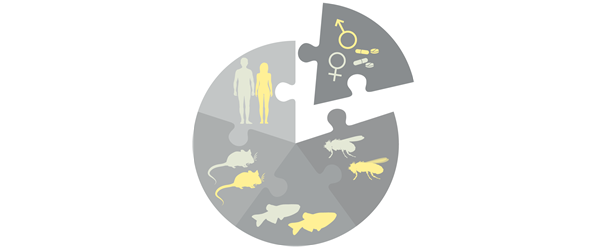Large animal models for Duchenne muscular dystrophy (DMD) are crucial for evaluation of diagnostic procedures and treatment strategies. Pigs cloned from male cells lacking DMD exon 52 (DMDΔ52) resemble molecular, clinical and pathological hallmarks of DMD, but die before sexual maturity and cannot be propagated by breeding. Therefore, we generated female DMD+/- carriers. A single founder animal had 11 litters with 29 DMDY/-, 34 DMD+/- as well as 36 male and 29 female wild-type offspring. Breeding with F1 and F2 DMD+/- carriers resulted in additional 114 DMDY/- piglets. With intensive neonatal management, the majority survived for 3-4 months, providing statistically relevant cohorts for experimental studies. Pathological investigations and proteome studies of skeletal muscles and myocardium confirmed the resemblance of human disease mechanisms. Importantly, DMDY/- pigs reveal progressive myocardial fibrosis and increased expression of connexin-43, associated with significantly reduced left ventricular ejection fraction already at age 3 months. Furthermore, behavioral tests provided evidence for impaired cognitive ability. Our breeding cohort of DMDΔ52 pigs and standardized tissue repositories provide important resources for studying DMD disease mechanisms and for testing novel treatment strategies.
A scalable, clinically severe pig model for Duchenne muscular dystrophy
equal first author contribution
shared last authorship
- Award Group:
- Funder(s): Else Kroener-Fresenius Foundation
- Award Id(s): EKFS 2018_T20
- Funder(s):
- Award Group:
- Funder(s): European Union
- Award Id(s): 812660
- Funder(s):
Currently Viewing Accepted Manuscript - Newer Version Available
- Split-screen
- Views Icon Views
- Open the PDF for in another window
-
Article Versions Icon
Versions
- Version of Record 16 December 2021
- Accepted Manuscript 19 November 2021
- Share Icon Share
-
Tools Icon
Tools
- Search Site
Michael Stirm, Lina Marie Fonteyne, Bachuki Shashikadze, Magdalena Lindner, Maila Chirivi, Andreas Lange, Clara Kaufhold, Christian Mayer, Ivica Medugorac, Barbara Kessler, Mayuko Kurome, Valeri Zakhartchenko, Arne Hinrichs, Elisabeth Kemter, Sabine Krause, Rüdiger Wanke, Georg J. Arnold, Gerhard Wess, Hiroshi Nagashima, Martin Hrabĕ de Angelis, Florian Flenkenthaler, Levin Arne Kobelke, Claudia Bearzi, Roberto Rizzi, Andrea Bähr, Sven Reese, Kaspar Matiasek, Maggie C. Walter, Christian Kupatt, Sibylle Ziegler, Peter Bartenstein, Thomas Fröhlich, Nikolai Klymiuk, Andreas Blutke, Eckhard Wolf; A scalable, clinically severe pig model for Duchenne muscular dystrophy. Dis Model Mech 2021; dmm.049285. doi: https://doi.org/10.1242/dmm.049285
Download citation file:
Advertisement
Sex matters in preclinical research

DMM calls for improved inclusion, analysis and reporting of sex as a biological variable in preclinical animal modelling research. Read the full Editorial by Monica J. Justice.
Subject collection: Building advocacy into research

DMM’s new series - Building advocacy into research - features interviews, ‘The Patient’s Voice’, with patients and advocates for a range of disease types, with the aim of supporting the highest quality research for the benefit of all patients affected by disease.
Travelling Fellowships for early-career researchers

DMM and its sister journals offer Travelling Fellowships of up to £3,000 to graduate students and post-doctoral researchers wishing to make collaborative visits to other laboratories. Find out more about our Travelling Fellowships and read stories from previous grant recipients.
Read & Publish Open Access publishing: what authors say

We have had great feedback from authors who have benefitted from our Read & Publish agreement with their institution and have been able to publish Open Access with us without paying an APC. Read what they had to say.
The Forest of Biologists
Our Publisher Claire Moulton recently visited the two Woodland Trust UK sites where we are planting new native trees for published Research and Review papers and protecting ancient woodland on behalf of our peer reviewers.
Other journals from
The Company of Biologists



